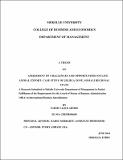| dc.description.abstract | The main purpose of this paper was to assess challenges and opportunities of live animal export of Somali region a case study of Jigjiga zone. In order to assess the challenges and opportunity of live animal export of Somali region of Jigjiga zone, a total (census) of 20 individual live animal exporters were surveyed. In the process of answering the basic questions, a questionnaire that include demographic profiles, trading practices, factors that challenge live animal export was designed in open ended, closed ended and likert scales. Moreover, interviews were held with top officials of ARDB, RCA and animal health bureau. After the data has been collected, it was analyzed using simple statistical techniques (tables and percentages) and descriptive statistics (mean and standard deviations).The results of the study indicates the limited availability of financial institutions, unavailability of formal live animal exporters institutions, high marketing costs, multiple taxations, bureaucracy of government institutions, harassment by petty officials, and overall loose relationship with government bodies were challenging live animal export of the Jigjiga zone. It also shows that exporters were highly benefited from high trust and strong relationship with their business partners, familiarity with animal quality attributes demanded in importing countries and strong clan arrangements. The study also found that formal live animal export of the area is increasing but the illegal live animal export was highly challenging the formal live animal exporters and the revenue of the region. Along this, the study found different participants acting in live animal export system. Based on the major findings, recommendations were forwarded to existing and potential live animal exporters, and concerned government bodies. | en_GB |


